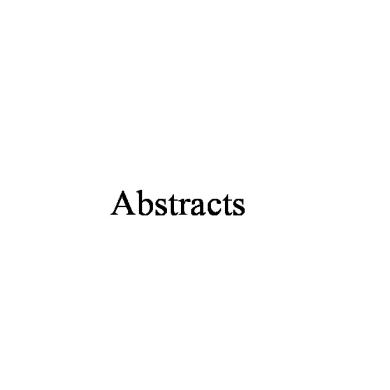Eaa Paper Abstracts
This document was uploaded by user and they confirmed that they have the permission to share it. If you are author or own the copyright of this book, please report to us by using this DMCA report form. Report DMCA
Overview
Download & View Eaa Paper Abstracts as PDF for free.
More details
- Words: 700
- Pages: 1
Fieldwork in an interpretive world: reconsidering the onsite relationships between subject, object, theory and practice. Oliver Harris, Cara Jones (CFA Archaeology Ltd) and Phil Richardson (University of Newcastle). This session is concerned with archaeological practice: more than this, we are concerned with how it is we come to know what we know. What is at issue is the relationship between what we call fieldwork and the interpretative strategies we deploy in order to understand what it is we have ‘found’. Traditionally archaeological excavation has been perceived as simply purely a process of objectively recording the nature and extent of archaeological layers and deposits, simply a means of data collection, where the material uncovered and the record produced by individual excavators is seen as being equivalent. Recent critiques have suggested that postprocessual archaeology has had little impact on data acquisition and thus, the concept of an objective past, being ‘out there’ to be found, still underlies our methodologies when we enter the field. Perhaps this should not be too surprising, a fundamental element of modernity, upon which the archaeological method was based, has been to construct representational systems that attempt to obscure or even hide the subjectivity of physical encounters. By thrusting the observer and embodied nature of knowledge and practice into the background a false objectivity has been constructed, which creates and enforces the subject versus object dichotomy. The physically embodied practice of excavation becomes increasingly abstracted and transformed into both text and distanced, visually acquired, knowledge. As John Barrett has argued the relationship between these understandings is considered to be a matter of method at one level, and yet of interpretation at another; the former of these presumed to be secure, the latter less so. Digging, recording and writing are some of the practices that interweave between the scales of analysis we examine, yet their relationships are rarely considered critically. Modernity too rests on the construction of multiple methodologies which disguise their own point of origin. By exploring archaeological practice it is possible to consider the construction of archaeological method and how this contributes to the ontological security of both the discipline and modernity at large. In this sense traditional techniques can be seen as a way of rendering a site familiar by transforming it into something we are used to encountering, such as a trench, rather than unfamiliar material remains of the past. This is the default position which defers our need to confront this unfamiliarity, until, or perhaps beyond, the point of interpretation. Work on site informs the end product, it is this process of talking about the features of the site whilst on the site, social interaction, reflexivity and multivocality that enable us to structure and empower our interpretation of the past. Is it the ‘performance’ of the dig that is perhaps more important than the end product, the standardized site report? While such discussions have taken place within archaeological theory, we are yet to examine fully how this may work and manifest itself when we enter the field. Do we then have a situation where postprocessual archaeology has left everything related to field practice in place or at least has done little to deconstruct our strategies or the concepts used to express them? If fieldwork is performed by people who, acknowledged or not, have very different approaches to the past, how does this limit what we can say? It is curious that many interpretive accounts have drawn on excavation reports written from very different theoretical positions, without considering how this has dramatically altered the written archaeology they are confronted with. This session welcomes papers that attempt to consider how the practice of fieldwork itself dictates the questions that can be asked of the material recovered, and limits and controls the interpretations that can be made. Speakers are also encouraged to consider how other forms of digging, recording and presenting archaeology can allow a truly multivocal approach to emerge. We also recognise that the varying concerns of processual and interpretive archaeologies are local in their dimension, yet archaeology is a global enterprise. Thus papers would also be welcome from outside the AngloAmerican sphere that may offer other perspectives on the relationship between field practice and interpretation.
Related Documents

Eaa Paper Abstracts
April 2020 6
Eaa Cork Abstracts Final
April 2020 7
Abstracts
June 2020 14
Abstracts
November 2019 35
Abstracts
May 2020 18





